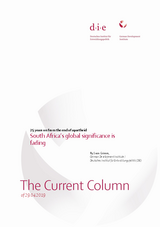25 years on from the end of apartheid:
South Africa’s global significance is fading
Grimm, SvenThe Current Column (2019)
Bonn: German Development Institute / Deutsches Institut für Entwicklungspolitik (DIE), (The Current Column of 29 April 2019)
Bonn, 29 April 2019. 27 April marked the 25th anniversary of South Africa’s first free and general elections. Like the Berlin Wall, they represented the dawn of a new global era. The country has since seen its international role change several times, most recently not for the better. The next general election will be held on 8 May. While it might be won comfortably by the ruling party, it could still prove difficult and will barely have any effect on the nation’s dwindling global role.
On 27 April of each year, South Africans celebrate Freedom Day, which marks the end of apartheid. There have also been some fundamental changes at global level during this time, not least as a result of the growing international significance of a number of states in the global South, including China, India, Brazil and, indeed, South Africa
South Africa as a winner of globalisation...On 27 April of each year, South Africans celebrate Freedom Day, which marks the end of apartheid. There have also been some fundamental changes at global level during this time, not least as a result of the growing international significance of a number of states in the global South, including China, India, Brazil and, indeed, South Africa
Despite, or perhaps even because of, global changes, these Southern nations are often referred to in foreign policy discussions as status quo powers. It is claimed that they seek to support the multilateral and rule-based global order. It is argued that South Africa would do well to maintain the rule system of the global order, as it is to this system that it and other Southern states owe their advancement.
For example, according to a study by the Bertelsmann Stiftung, South Africa “only” ranks 35th among the winners of globalisation, yet it takes first place among non-OECD countries. In fact, it is the states that consider Germany a global development partner that, like Germany, Europe and many industrialised nations themselves, benefit from multilateralism and rule-based globalisation.
The last 25 years have seen many changes for the better and afforded South Africa a positive global role as one of the potential shapers of a global order. The country’s accession to BRICS in 2013 could be viewed as the high point of its global role. South Africa has gone from international pariah to sought-after partner. And yet, it has seen its significance wane in recent years.#
… with massive domestic policy issuesThe last few years of the Zuma presidency were lost years for South Africa. The economic growth spurred on by the advent of the democratic order has tailed off significantly. Factoring in population growth, we would actually be dealing with stagnation or regression. Structural change failed to get off the ground, let alone rapid transformation in the economic model towards greater sustainability.
President Cyril Ramaphosa, in office since 2018, is yet to initiate any fundamental changes; pressure within the ruling party to maintain unity is too great. The election on 8 May represents the first opportunity for coalitions within the ruling party to shift and necessary changes to be made. The strength of the incumbent party’s expected majority is more decisive in this context than the fact of an electoral victory itself. President Ramaphosa knows how important internal stability is for attracting necessary investments, an insight that slows him down at the same time.
Global transformation with South Africa as partner?Investments are especially vital if South Africa is itself to become more sustainable and secure its long-term position. Currently, the nation is not even a pioneer within Africa, as illustrated by climate policy as an example of global discussion.
South Africa is the world's 14th largest producer of carbon emissions, generating roughly the same volume per head of population as Germany (some 10 metric tonnes per year) against a backdrop of much greater social inequality. In other words, a small upper class is living far beyond its environmental means by global standards. Despite tremendous potential for renewable energy, not least solar power, renewables account for less than 8% of the energy supply, while carbon provides close to 80%. Due to reasons of patronage and corruption, the Zuma government promoted traditional coal-based energy production and, in particular, expensive nuclear power.
The increasingly rough global winds are slowing South Africa down further. Smaller boats quickly get tossed around in stormy seas, and South Africa is looking like an ever smaller vessel compared with the large tankers of the other BRICS countries, the European Union and the United States. This situation makes it especially important to have a reliable compass and stability on board, things that have been apparently lacking in Pretoria in recent years.
It is questionable whether the country will gain traction under President Ramaphosa. His deeply divided party are hardly likely to rally around him in unity after the election. Even after the forthcoming election on 8 May, the prospects of a South African renaissance are very slim. As Africa’s only G20 country, South Africa remains internationally important, but the risk of losing more of its global significance means it cannot rest on its laurels in this regard.


